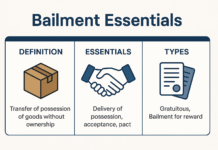Illustrates the duties of an agent to his principal ?
The Agent’s Pledge: Understanding Your Responsibilities to Your Principal
When you act as an agent for someone else (the principal), you step into a role of trust and responsibility. The Indian Contract Act clearly defines the duties you owe to your principal. Understanding these obligations is paramount for a smooth and legally sound agency relationship. Let’s explore these key duties.
1. Following the Roadmap: Duty to Follow Directions or Customs (Section 211)
As an agent, your primary duty is to act according to the principal’s instructions. If the principal hasn’t given specific directions, you must adhere to the prevailing customs of that particular type of business at that location.
- If you deviate from the principal’s instructions or established customs, you do so at your own risk. This means you could be held liable for any losses incurred by the principal due to your unauthorized actions.
Important Note: This duty doesn’t compel the agent to go above and beyond what’s reasonably expected within those directions or customs.
Example: If a principal instructs their agent to sell goods at a specific price, the agent must adhere to that price. If no price is specified, the agent should sell at the market price customary for such goods.
2. Acting with Care and Skill: Duty to Take Reasonable Care and Skill (Section 212)
Your principal expects you to handle their business with competence. Section 212 mandates that an agent must conduct the agency’s business with the skill a reasonably prudent person would exercise in a similar role, unless the principal is aware of your lack of specific expertise.
- You are liable to compensate your principal for any direct loss or damage resulting from your neglect, lack of skill, or misconduct.
Think of it this way: If you’re hired as a real estate agent, you’re expected to have a basic understanding of property valuation and the local market. If you negligently misrepresent a property and it causes financial loss to your principal, you could be held responsible.
3. Keeping it Transparent: Duty to Keep Accounts (Section 213)
Accountability is key. Section 213 states that an agent is obligated to provide proper accounts to the principal when demanded. This ensures transparency in all financial dealings related to the agency.
This includes: Providing records of income received, expenses incurred, and any other financial transactions carried out on the principal’s behalf.
4. Seeking Guidance: Duty to Behave Like a Person of Ordinary Prudence in Difficulty (Section 214)
When faced with challenging situations where the path forward isn’t clear, an agent has a duty to act responsibly. Section 214 requires you to use all reasonable diligence in communicating with your principal to obtain their instructions.
- If there’s no time to consult the principal, you are permitted to act with the discretion of an ordinarily prudent person in that situation.
Example: If a perishable shipment is delayed, and there’s no time to contact the principal for specific instructions, the agent should take reasonable steps to mitigate potential losses, such as arranging for temporary storage.
5. Avoiding Conflicts: Duty to Avoid Conflict of Interests (Section 215)
Your loyalty should lie with your principal. Section 215 addresses the duty to avoid conflicts of interest. If you, as an agent, deal on your own account in the business of the agency without the principal’s consent, the principal has options:
- They can repudiate the transaction if it’s shown that you dishonestly concealed any material fact.
- They can also repudiate if your dealings have been disadvantageous to them.
The provided illustration clearly shows this: If an agent is asked to sell their principal’s estate but buys it themselves secretly, the principal can cancel the sale if they can prove dishonest concealment or that the sale was unfavorable.
6. No Secret Gains: Duty to Handover Secret Profits (Section 216)
Any financial benefits you gain personally from the agency transaction, without the principal’s knowledge, belong to the principal. Section 216 mandates the duty not to earn and to handover secret profits.
- If you secretly profit from a transaction you’re handling for your principal, the principal is entitled to claim those profits from you.
Example: If an agent selling goods for their principal secretly receives a kickback from the buyer, the principal can demand that the agent hand over that kickback.
7. Passing on the Proceeds: Duty to Give All Sums Received Under Agency (Section 218)
You’re holding the principal’s money, so you need to pass it on. Section 218 states that an agent is bound to pay the principal all sums received on their account.
- However, you are entitled to deduct any money rightfully due to you, such as advances made, expenses properly incurred, and your agreed-upon remuneration.
8. No Sub-Delegation Without Consent: Duty Not to Delegate (Section 190)
Generally, “an agent cannot delegate his authority.” Section 190 outlines the duty not to delegate your responsibilities to a third party without the principal’s explicit consent. The rationale is that the principal chose you based on your skills and judgment.
- There are exceptions, such as when the very nature of the business necessitates delegation or when it’s customary in that trade.
Example: A sales agent typically can’t delegate the task of making a sale to someone else without the principal’s permission. However, a managing agent might be implicitly authorized to delegate certain administrative tasks.
9. Protecting Interests After Termination: Duty Upon Principal’s Death or Insanity (Section 209)
Even when the agency ends due to the principal’s death or unsound mind, your responsibility doesn’t immediately vanish. Section 209 imposes a duty to take reasonable steps to protect and preserve the interests entrusted to you on behalf of the deceased or incapacitated principal’s representatives.
In essence, you need to act as a temporary caretaker to prevent immediate loss or damage.
Upholding Trust: The Core of the Agency Relationship
These duties underscore the fiduciary nature of the agent-principal relationship. Agents are expected to act with loyalty, diligence, and transparency in all dealings. Understanding and fulfilling these obligations is crucial for maintaining a healthy and legally sound partnership.
















